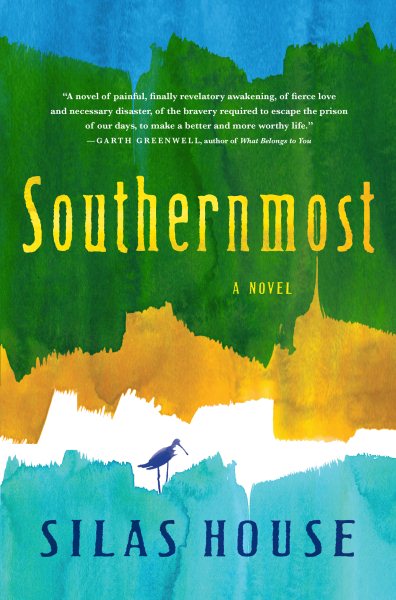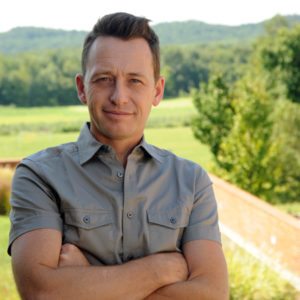Interview by Jana Hoops. Special to the Clarion-Ledger Sunday print edition (June 17)
As the nationally bestselling author of five novels who holds a coveted membership in the Fellowship of Southern Writers, Silas House shares what may be his most personal story yet with the recent release of Southernmost.
 His new novel chronicles the path of Asher Sharp, a Tennessee minister whose struggle with his brother’s “coming out” finally forces a decision for the small-town preacher that results in chaotic consequences for his congregation and his marriage–and threatens his relationship with son. Sharp spontaneously decides to head to Key West, the southernmost point in the country, to search for his brother and seek a long-awaited resolution.
His new novel chronicles the path of Asher Sharp, a Tennessee minister whose struggle with his brother’s “coming out” finally forces a decision for the small-town preacher that results in chaotic consequences for his congregation and his marriage–and threatens his relationship with son. Sharp spontaneously decides to head to Key West, the southernmost point in the country, to search for his brother and seek a long-awaited resolution.
A former commentator for NPR’s All Things Considered, House is the recipient of three honorary doctorates, and is the winner of the Nautilus Award, an E. B. White Award, the Appalachian Book of the Year, the Hobson Medal for Literature, and many other honors.
He is a frequent contributor to The New York Times, and his work has appeared in the Oxford American, Narrative, Blackbird, Newsday and other publications.
Tell me, briefly, what your childhood in Appalachia was like, and how it affected your writing.

Silas House
I grew up in a really tight-knit family and we were taught to wear our Southernness–our ruralness–as a badge of honor. In many ways it was a pretty romantic childhood because I was able to roam the woods and I knew everyone in my community really well. I was always surrounded by family or people who loved me like family.
But my father was a Vietnam vet with PTSD and we were very immersed in the evangelical church, and both of those things were instrumental in shaping my worldview. Not to mention that I was a really sensitive boy who loved to read. I loved basketball, too, but my big secret was that I loved books more.
You are the recipient of many writing awards, some of which are mentioned above. What did it mean to you to be inducted into the Fellowship of Southern Writers last fall?
To be welcomed in amongst some of the people who influenced me the most was really humbling, and especially to know how amazing it is to be a part of such a literary tradition. I’m really proud to say I’m a Southern writer. To me that always has only a good connotation, and one reason is because I really do believe we fellowship in a different way than other regions of the country. I don’t mean to generalize, but there is a generosity and a spirit of encouragement that exists among Southern writers that is special.
You new novel, Southernmost, is set in the South, and in an essay that you wrote about this book, you state that the South is “a whole lot like the rest of the country. Injustice and intolerance exist here, and everywhere.” You go on to say that “By looking at this microcosm of America called the South with such focus, we can more clearly see our whole nation in a moment when we are in dire need of understanding one another.” Explain how this is so.
I think people think of things like homophobia, racism, misogyny, xenophobia, and the like, and they think that’s more rampant in the South or among rural people. I don’t think it is. I think it’s exhibited in a different way. And this idea that country people, or Southerners, or more prejudiced lets the rest of the country off the hook.
Injustice exists everywhere in this country and I get tired of it all being blamed on us. It’s a national problem, not a regional one, and I think we’d be better served to look at it that way instead of always just shifting blame. I’ve lived in the South my whole life but the worst physical homophobia I’ve suffered has been in New York City and Chicago.
In Southernmost, main character Asher Sharp is a minister struggling to come to grips with where he stands on issues of sexuality, as a church leader, father, husband–and brother to Luke, who had come out as a gay man 10 years earlier. It seems the reactions of his wife and church members, compared with others, depict two strong reactions to a gay lifestyle: those who are either fully accepting or strongly opposed. Have you found, though, that there is somewhat of a middle ground in which many are wrestling with aligning their faith with such an acceptance?
I would say that most people are in that middle ground, and that’s one reason I wrote the book from a straight person’s point of view, instead of writing another coming out story. The main character, Asher, is often questioning just how prepared he is to be totally accepting of gay lives, although he is definitely far more evolved on the issue than his wife, who is totally opposed.
To me, he’s representative of a whole lot of people right now who want very badly to fully embrace everything about a family member, but still have that little nagging voice in the backs of their minds saying, “But what if they kiss?”
One of the things I enjoyed most was working on Asher’s interiority where he’s struggling with things like that. His mother-in-law, Zelda, is probably the best representative of that middle, though–she’s been taught to shun gay people her whole life, yet her natural inclination is to be good to everyone. And her wishy-washiness really costs her an important relationship in the book.
Tell me about your decision to write this book now. How long was it in the making, and what did you want it to convey?
I worked on this book off and on for about eight or nine years. During that time, I wrote a short middle grade novel, Same Sun Here, but for almost the last decade this has been the most important thing to me. It’s a book that I really felt compelled to write. I couldn’t stop thinking about these characters. Over that time the issue really evolved. For example, in 2015, when marriage equality passed, I had to re-write the entire book.
So now it is set mostly during the summers of 2015 and 2016. It’s about as contemporary as you can get in a novel. And in a way I think the book is far more relevant now than when I was writing it. Since the election a lot of Americans have had to think about how fundamentally they disagree with the very people they love the most. LGBTQ people have been dealing with that issue forever. And that’s one of the themes in the book, the ability to love one another despite strongly disagreeing.
Growing up as a gay person, your Pentecostal parents accepted your sexuality even though it was opposed to their church’s teaching. Did that surprise you–and would you explain how this spiritual influence affected you?
Well, that was a very long process. It was about 10 years after I came out before my parents and I were on the same page. I really admire their ability to grow and think outside the box of their own church on this issue. To me, it’s a real testament to someone’s character when they’re able to do that kind of self-examination and question themselves on whether they believe something in their hearts or if they just believe something because they’ve been taught that by others their whole lives.
Water seems to be a theme in Southernmost, with destructive flooding, rain, the Gulf of Mexico, and the ocean off the Florida Keys serving as important elements to the story. Is there a symbolism here that you could explain?
I never really think about symbolism when I’m writing at all. To me, that has to be something that is completely organic. So, when a novel is finished, those symbols and metaphors start to show themselves and water is definitely omnipresent in the book. I think the main reason is because water is absolutely the essence of life. If any tangible thing on earth could represent the Divine, I guess water would be the best. And that goes hand in hand with these characters who are all thinking about the Divine in one way or another, either struggling against belief or doubt.
Is there anything else you’d like to include, about the book or your own personal life?
One thing I love about the book is that I got to capture the act of driving across the South. One of my favorite sections in the book is when Asher and (his son) Justin are driving from Tennessee to Florida. I made that drive a couple times while writing and I was so happy to preserve so many of the church signs and roadside stands selling peaches and watermelons, and even people I saw along the way–the homeless man holding a ‘hungry” sign, the Cherokee woman being harassed as she walked into a truck stop, the children catching a fish on the pier, a wealth of friendly cashiers. I love driving in the South in the summertime; it’s like a meditation. To me, that’s when I love it the most.
Are you already working on another writing project at this time?
I always have a few projects going at once. Right now, I’m toying with the idea of a big family epic, which I’ve always wanted to write, and I’m trying to wrangle a play about Mary Todd Lincoln.
Silas House will be at Lemuria on Tuesday, June 19, at 5:00, to sign and read from Southermost.


Comments are closed.